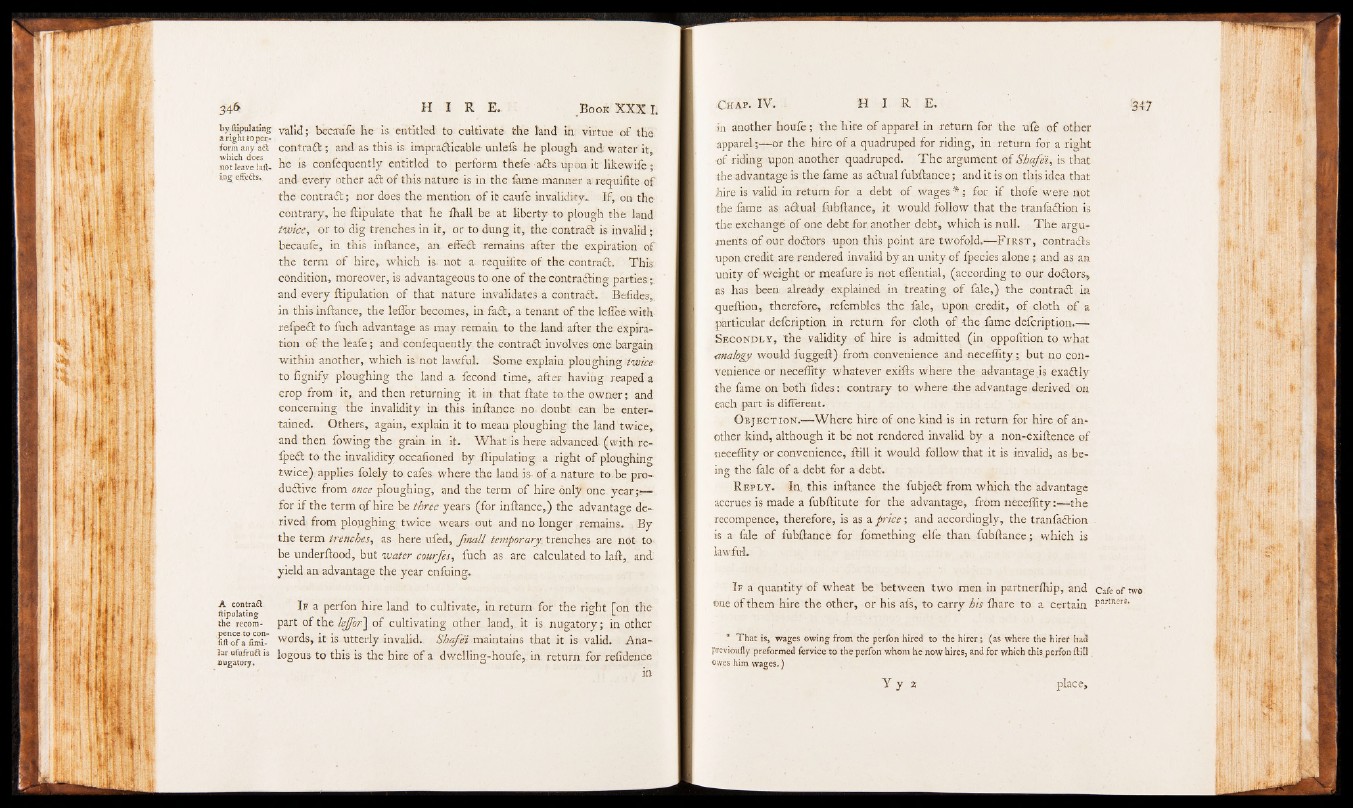
by ftipulatlng
aright to perform
any aft
which does
not leave Jailing
elfefts..
A contract
itipulating
the recom-
. pence-to con-
fill o f a fimi-
lar ufufruft is
nugatory.
valid; becaufe he is entitled to cultivate the land in virtue of the.
eontraft ; and as this is impracticable unlefs he plough and water it,
he is confequently entitled to perform thefe afts upon it likewife ;
and every other aft of this nature is in the lame: manner a requifite of
the eontraft; nor does the mention of it caufe invalidity- If, on the
contrary, he ftipulate that he lhal-1 be at liberty to plough the land
twice, or to dig trenches in it, or to dung it, the eontraft is invalid;
becaufe, in this inftance, an efieft remains after the expiration of
the term of hire,, which is. not a requifite of the eontraft. This
condition, moreover, is advantageous to one of the cantrafting parties
and every ftipulation of that nature invalidates-a eontraft- Befides,,
in this inftance, the leflor becomes, in faft, a tenant of the leflee with
refpeft to fuch advantage as may remain to the land after the expiration
of the leafe; and confequently the eontraft involves one bargain
within another, which is not lawful. Some explain, ploughing .twice-
to lignify ploughing the land a. fecond time, after having reaped a
crop from it, and then returning it in that ftate to the owner; and
concerning the invalidity in this inftance no doubt can be entertained.
Others, again, explain it to mean ploughing the land twice,,
and then fowing the grain in it. What is here advanced, (with re-
fpeft to the invalidity occafioned by ftipulating a right of ploughing
twice)-applies folely to cafes where the land is. of a nature to.be productive
from once ploughing, and the term of hire only one. year;—
for if the term of hire be three years (for inftance,) the advantage derived
from ploughing twice wears out and no longer remains. By
the term trenches, as here ufed, fmall temporary, trenches are not to
be underftood, but water courfes, fuch as are calculated to laft, and'
yield an advantage the year enfuing.
I e a perfon hire land t o . cultivate, in return for the right [on the
part of the leJJor~\ of cultivating other land, it is nugatory; in other
words, it is utterly invalid. Shafei maintains that it is valid. Analogous
to this is the hire of a dwelling-houfe, in. return for refidence
in
in another houfe; the hire of apparel in return for the rife o f other
apparel;— or the hire o f a quadruped for riding, in return for a right
o f riding upon another quadruped. T h e argument of Shafei, is that
the advantage -is the fame as aftual fubftance; and it is on this idea that
.hire is valid in return for a debt of wages * ; for if thofe were not
the fame as aftual fubftance, it would follow that the tranfaftion is
the exchange of one debt for. another debt, which is null. The arguments
of our doftors upon this point are twofold.— F i r s t , contracts
upon credit are rendered invalid by an unity o f fpecies alone; and as an
unity o f weight or meafure is not eflential, (according to our doftors,
as has been already explained in treating of fale,) the eontraft in
queftion, therefore, refembles the fale, upon credit, of cloth of a
particular defeription in return for cloth of' the fame defeription.—
S e c o n d l y , the validity of hire is admitted (in oppofition to what
analogy would fuggeft) from convenience and neceflity; but no convenience
or neceflity whatever exifts where the advantage _is exaftly
the fame on both Tides: contrary to where the advantage derived on
each part is different.
O b j e c t i o n .— Where hire of one kind is in return for hire of another
kind, although it be not rendered invalid by a non-exiftence of
neceflity or convenience, ftill it would follow that it is invalid, as being
the fale of a debt for a debt.
R e p l y . In. this inftance the fubjeft from which the advantage
accrues is made a fubftitute for the advantage, from n e c e f l i t y t h e
recompence, therefore, is as a price; and accordingly, the tranfaftion
is a fale of fubftance for fomething elfe than fubftance; which is
lawful.
I f a quantity of wheat be between two men in partnerftiip, and cafe
one of them hire the other, or his afs, to carry his Ihare to a certain partn
* T h a t is , wages owing from the perfon hired to the h ire r ; fa s where the hirer had
previoufly preformed fervice to the perfon whom he now hires, and for which this perfon ftill
owes him wages.)